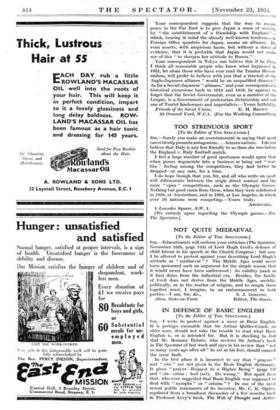RUSSIA AND JAPAN
[To the Editor of THE SPECTATOR.] SIR,—Your Special Correspondent in Tokyo must indeed be complimented on his ingenious attempts to represent the danger of war in the Far East as due equally to Japanese fear of Soviet " aggression " and to Soviet fear of Japanese aggression : and to use the occasion for the advocacy of an Anglo-Japanese alliance. Perhaps you will permit me to remind him of a few facts.
No Soviet economist, or political writer, has ever suggested that " Japan cannot relinquish the goal of wider expansion in Asia." The Soviet Press always gives due prominence to those saner elements among the Japanese capitalist parties who recognize the folly of the aggressive policy of the Japanese feudal militarists. A recent example is the space given in the Soviet Press of November 12th to a striking article on this subject by Mr. Nakano in the magazine " Koiso."
But the fact is that, while your correspondent would be hard put to it to find any Soviet writer who has advocated Soviet " expansion " in Asia, or against Japan, nothing is easier than to find leading Japanese statesmen and journalists who have advocated Japanese expansion—beginning with the late War Minister, General Araki. Your correspondent talks at large of " activists " on either side who want to force the hand of their Governments before the enemy gets too strong. Let him name a single public statement of this kind on the Soviet side, whether by leading' statesmen or by obscure provincial journalists. We can give him plenty of quotations on the Japanese side, from the Niehi-Nichi, the Nihon, the Japanese-controlled Harbin Press, and other newspapers.
If the policy of " expansion " were only confined to speeches and articles, there might be less cause for anxiety. But, after all, there hai been the bombardment of Shanghai : there has been what your correspondent so mellifluously describes as the Japanese " separation " of Manchukuo from China. It requires a considerable measure of—ingenu- ousness, shall I say ?—for your correspondent to compare the Soviet Union's construction of forts and air-bases on what, after all, is its own territory, with open Japanese war prepara- tions on territory conquered by military aggression only three years ago, with air bombing of civilians, burning of villages, and every similar atrocity : and to suggest that Japan believes it is " acting defensively." Your correspondent suggests, that the way to ensure peace in the Far East is to give Japan a sense of security by " the establishment of a friendship with England "— which, bearing in mind the already well-known tenderness in Foreign Office' quarters for Japan, means an alliance. Re even asserts, with suspicious haste, but without a shred of evidence, that it is probable that Japan would not make use of this " to sharpen her attitude to Russia."
—Your correspondent in Tokyo can believe this if he likes. I think all reasonable people who know what happened in 1931, let alone those who have ever read the Tanaka Memor- andum, will prefer to believe with you that a renewal of the Anglo-Japanese alliance " would be an unqualified disaster." As for a Soviet-Japanese " alliance," and your correspondent's historical excursions back to 1910 and 1916, he appears to forgefthaf the Soviet Goiwnment, even as a member of the League, is a Government of proletarian dictatorship and not one of Tsarist landowners and imperialists.—Yours faithfully, Friends of the Soviet Union, E. H. BROWN 83 Ormond Yard, W.C.1. (For the Working Committee).

























































































 Previous page
Previous page